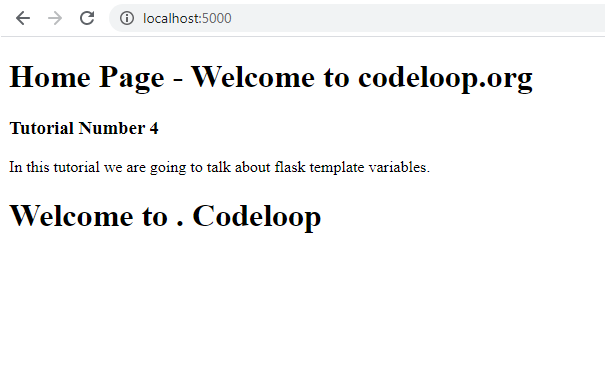In this Flask Tutorial iam going to talk about Template Variables in Flask .
so sometimes we need to send data from our flask views to the html files, for this purpose
you can use template variables. for example sometimes we need to send data from our
flask views to the database. now in this example we are not going to use the data from the
database, we are going to just send some predefined data from our index view to the index.html.
If you are interested in Web Development with Django Framework, than you can read the
complete articles in this link, Django Web Development Tutorials.
OK now this is our app.py file, we are going to just bring changes in our index view, because we want to send some data from index view to our index.html.
|
1 2 3 4 5 6 7 8 9 10 11 12 13 14 15 16 17 18 19 20 21 22 23 24 25 26 27 28 |
from flask import Flask, render_template #create the object of Flask app = Flask(__name__) #creating our routes @app.route('/') def index(): data = "Codeloop" return render_template('index.html', data = data) #contact routes @app.route('/contact') def Contact(): return render_template('contact.html') #run flask app if __name__ == "__main__": app.run(debug=True) |
So you can see that The function render_template provided by Flask integrates the Jinja2 template
engine with the application. This function takes the filename of the template as its first argument.
And the second one is the data that we want to send for index.html file, and you can see that i have sent just a simple predefined name value to my html file.
Now we want to get this data in our index.html, so these are our html files.
templates/base.html
|
1 2 3 4 5 6 7 8 9 10 11 12 13 14 15 |
<!DOCTYPE html> <html lang="en"> <head> <meta charset="UTF-8"> <title>{% block title %} {% endblock %}</title> </head> <body> {% block body %} {% endblock %} </body> </html> |
templates/index.html
|
1 2 3 4 5 6 7 8 9 10 11 12 13 14 15 16 17 18 19 20 |
{% extends 'base.html' %} {% block title %} Home {% endblock %} {% block body %} <h1>Home Page - Welcome to codeloop.org</h1> <h3>Tutorial Number 4 </h3> <p> In this tutorial we are going to talk about flask template variables. </p> <h1>Welcome to . {{data}}</h1> {% endblock %} |
You can see that in the bottom we have used {{}} placeholder to get the data from our index view, this is a special placeholder that tells the template engine that the value that goes in that place should be obtained from data provided at the time the template is rendered.
Jinja2 recognizes variables of any type, even complex types such as lists, dictionaries and objects.
templates/contact.html
|
1 2 3 4 5 6 7 8 9 10 11 12 13 14 15 16 17 18 19 20 |
{% extends 'base.html' %} {% block title %}Contact {% endblock %} {% block body %} <h1>Contact Page - Welcome to codeloop.org</h1> <h3>Tutorial Number 4 </h3> <p> In this tutorial we are going to talk about flask template variables. </p> {% endblock %} |
Template Variables Filters in Flask
Also there are different filters that you can use with Template Variable like this.
|
1 |
Welcome to . {{data|capitalize}} |
Variable Filters
| Name | Description |
| safe | Renders the value without applying escaping |
| capitalize | Converts the first character of the value to uppercase and the rest to lowercase |
| lower | Converts the value to lowercase characters |
| upper | Converts the value to uppercase characters |
| title | Capitalizes each word in the value |
| trim | Removes leading and trailing whitespace from the value |
| striptags | Removes any HTML tags from the value before rendering |
So now if you run the project, this will be the result
http://localhost:5000/

Also you can watch my complete 4 hours training on Flask Web Development
Subscribe and Get Free Video Courses & Articles in your Email